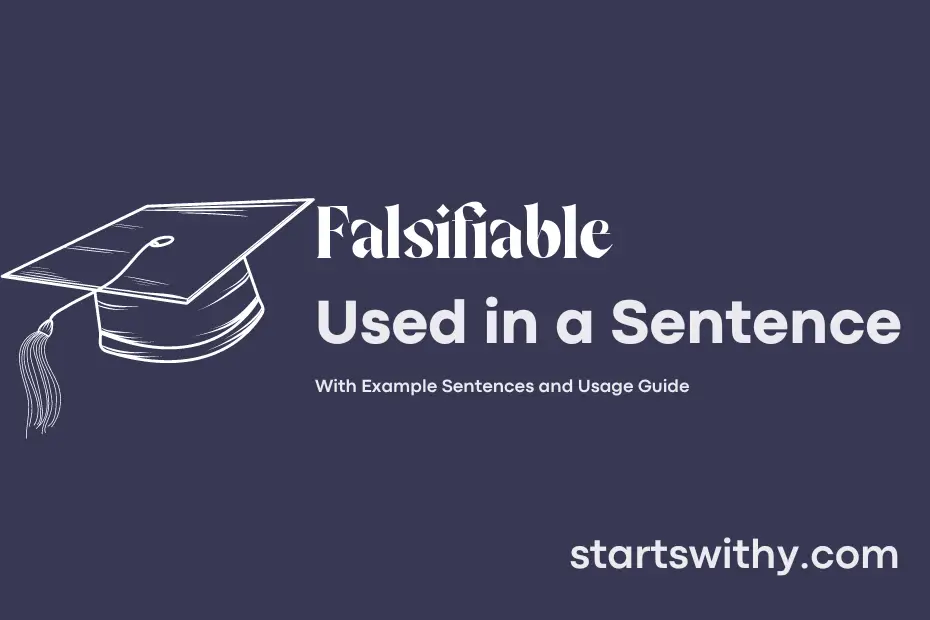Have you ever heard of the term “falsifiable”? In the realm of science and research, a falsifiable statement is one that can be proven false through testing or observation.
When a statement is falsifiable, it means that there are conditions or evidence that could potentially demonstrate it as untrue. This concept is crucial in scientific inquiry as it allows theories and hypotheses to be rigorously tested and either supported or rejected based on empirical evidence.
7 Examples Of Falsifiable Used In a Sentence For Kids
- Our teacher taught us about falsifiable things today.
- We can test if something is falsifiable by doing an experiment.
- Scientists use falsifiable ideas to learn new things.
- When we ask questions, we can find out if they are falsifiable.
- It is important to have falsifiable answers to our questions.
- We can learn a lot by thinking about falsifiable ideas.
- Let’s try to come up with our own falsifiable theories!
14 Sentences with Falsifiable Examples
- In a science experiment, it is important to create hypotheses that are falsifiable to ensure accurate results.
- When conducting research for a college assignment, it is crucial to formulate falsifiable statements to test theories effectively.
- During a debate in college, presenting falsifiable arguments can help strengthen your case and engage the audience.
- As a student in India, understanding the concept of falsifiable evidence can enhance critical thinking skills.
- Writing a lab report requires clear and falsifiable hypotheses to demonstrate a thorough understanding of the experiment.
- In a psychology class, discussing falsifiable theories can lead to insightful debates and analysis of human behavior.
- Prioritizing falsifiable research methods in sociology can lead to valuable insights and contribute to academic discussions.
- Participating in a philosophy seminar requires the ability to present falsifiable arguments that withstand critical scrutiny.
- When studying economics, students can benefit from analyzing falsifiable data to make informed predictions about market trends.
- Formulating falsifiable hypotheses in a political science assignment can lead to a deeper understanding of governance systems.
- Attending a literature discussion group allows students to explore falsifiable interpretations of texts and characters.
- Presenting a falsifiable thesis statement in an English literature essay can demonstrate analytical skills and textual understanding.
- A mathematics problem-solving workshop may challenge students to create falsifiable equations to arrive at accurate solutions.
- Engaging in a history debate could involve supporting arguments with falsifiable evidence from reliable sources and primary documents.
How To Use Falsifiable in Sentences?
To use the term Falsifiable in a sentence, you need to understand its meaning and how it is used in the context of scientific inquiry.
Falsifiable refers to a concept or hypothesis that can be proven false through observations or experiments. In scientific research, a hypothesis must be falsifiable in order to be considered valid.
Here’s a simple example of how to use Falsifiable in a sentence:
“In order to determine if the hypothesis is falsifiable, researchers will conduct experiments to test its validity.”
When using Falsifiable in a sentence, it is important to consider the context and make sure it accurately reflects the concept of something that can be proven false.
It’s also helpful to understand that Falsifiable is often used to distinguish between empirical theories that can be tested and potentially disproven, and beliefs or claims that cannot be tested or verified.
By incorporating Falsifiable into your scientific discussions or writing, you can demonstrate a clear understanding of the scientific method and the importance of evidence-based reasoning.
Conclusion
In scientific research, falsifiable sentences play a crucial role in testing hypotheses and theories. These sentences can be empirically tested and potentially proven wrong, allowing for the progression of knowledge through the scientific process. For example, statements like “All swans are white” are falsifiable because by observing a black swan, the statement could be disproven.
Falsifiable sentences are essential in distinguishing between scientific claims and those that are not testable or verifiable. They provide a clear framework for conducting rigorous research and forming reliable conclusions based on evidence. By embracing falsifiability, researchers can ensure the validity and reliability of their findings, contributing to the advancement of scientific understanding.



